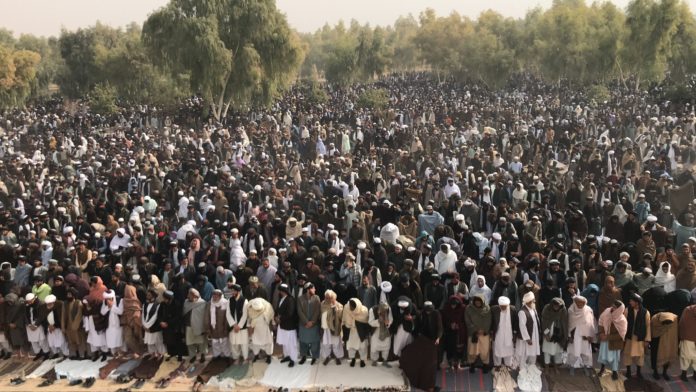Afghanistan’s southern city of Kandahar was reeling under draught a week ago, but the situation changed after thousands of Afghans gathered to make a special prayer for rain (Salatul Istisqa).
For two days it has been raining in the region and the metrological department has predicted a week-long downpour for the desperate people of the city.
On December 25, Kandahar’s Information and Culture department chief, Hafiz Saidullah, told the media that tens of thousands of people from towns and villages had joined the prayers.
The prayers were organised by the Islamic Emirate and pictures and videos of the prayers were widely shared on different social media platforms.
According to an Islamic Emirate official, Supreme Leader Hibatullah Akhundzada also sent a message and greetings to the attendees, urging them to work harder. Netizens reacted to the rain and called it a blessing of Allah at the right time.
Farhan Hotak, a freelance journalist in Kabul tweeted: “Kandahar City, Aino Mina, people are coming to enjoy miraculous rain that hasn’t happened in a long time”. In another tweet, he said: “A local farmer in Lashkargah tells me that this year’s crops look promising for him, wheat will be good he says.”
Hasib Noor, Founder and Director of The Legacy Institute in the United States, attached a picture of prayers and tweeted: “There was a drought in Afghanistan. 1000s of Afghans (Kandahar pictured below) gathered to pray the rain prayer asking Allah for rain. It started raining and will rain for a week. Allah is the greatest.”
Subscribe to our newsletter and stay updated on the latest news and updates from around the Muslim world!
Muslims traditionally pray for rain (Salatul Istisqa) during drought-like situations in different parts of the world. Currently, a humanitarian crisis is looming in Afghanistan and the county is witnessing the worst drought and food shortages in decades. Millions are on the verge of starvation.
The prime reason for the situation is the lack of funds in the country. Currently, more than $9.5 billion of Afghanistan’s foreign assets are frozen by the U.S. administration. The Islamic Emirate’s Deputy Foreign Minister Sher Mohammad Abbas Stanikzai had warned that the impact of frozen funds is on the common people of Afghanistan.
The United Nations had earlier warned that “23 million people are facing hunger, malnourished children are overflowing in health facilities, 70 percent of teachers are working without salaries and millions of students are out of schools…
“As the international development support has frozen up, basic social services that all Afghans depend on are collapsing. Families simply do not have the cash for everyday transactions, while the key commodities continue to rise.”






















